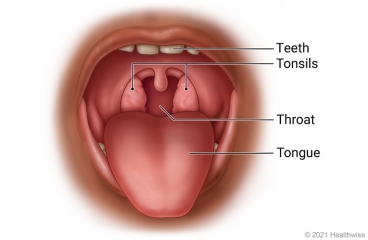Sore Throat in Children: Care Instructions
Overview

Infection by bacteria or a virus causes most sore throats. Cigarette smoke, dry air, air pollution,
allergies, or yelling also can cause a sore throat. Sore throats can be painful and annoying. Fortunately,
most sore throats go away on their own.
Home treatment may help your child feel better sooner. Antibiotics are not needed unless your child has a
strep infection.
Follow-up care is a key part of your child's treatment and safety. Be sure to make and go to all
appointments, and call your doctor if your child is having problems. It's also a good idea to know your
child's test results and keep a list of the medicines your child takes.
How can you care for your child at home?
-
If the doctor prescribed antibiotics for your child, give them as directed. Do not stop using them just
because your child feels better. Your child needs to take the full course of antibiotics.
-
Have your child gargle with warm salt water several times a day to help reduce swelling and relieve pain.
Mix 1/2 teaspoon of salt in 1 cup of warm water. Most children can gargle when they are 6 years old.
-
Give acetaminophen (Tylenol) or ibuprofen (Advil, Motrin) for pain. Do not use ibuprofen if your child is
less than 6 months old unless the doctor gave you instructions to use it. Be safe with medicines. Read and
follow all instructions on the label. Do not give aspirin to anyone younger than 20. It has been linked to
Reye syndrome, a serious illness.
-
Children over 6 years old can try sucking on lollipops or hard candy.
-
Have your child drink plenty of fluids. Drinks such as warm water or warm soup may ease throat pain. Cold
foods like Popsicles and ice cream can soothe the throat.
-
Keep your child away from smoke. Do not smoke or let anyone else smoke around your child or in your house.
Smoke irritates the throat.
-
Place a cool-mist humidifier by your child's bed or close to your child. This may make it easier for your
child to breathe. Follow the directions for cleaning the machine.
When should you call for help?
 Call 911
anytime you think your child may need emergency care. For example, call if:
Call 911
anytime you think your child may need emergency care. For example, call if:
Call your doctor now or seek immediate medical care if:
Watch closely for changes in your child's health, and be sure to contact your doctor if:
|
|
-
Your child has any new symptoms, such as a rash, an earache, vomiting, or nausea.
|
|
|
|
Current as of: September 27, 2023
Content Version: 14.0
Care instructions adapted under license by your
healthcare professional. If you have questions about a medical condition or this instruction, always ask
your healthcare professional. Healthwise, Incorporated disclaims any warranty or liability for your use of
this information.